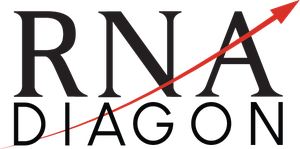RNADIAGON - Excellence in research and development of non-coding RNA DIAGnostics in Oncology
 Cancer occurs in more than 2 million individuals every year in Europe alone. It is widely recognized that early diagnosis and monitoring of the disease - during therapy and post-treatment follow-up- is a key step for successful patient management: it helps to offer on-time curative intervention and selecting the most appropriate therapy, improves the quality of life, while contributing to reduce the economic and social burden for both patients and society. There are screening programs available for early detection of some cancers such as colorectal cancer (CRC). Unfortunately, current CRC screening tests suffer with unsatisfactory sensitivity and specificity and low compliance of targeted population. On the other hand, there are cancers with poorly performing biomarkers as in the case of hepatocellular carcinoma (HCC), or no biomarkers at all (e.g. renal cell carcinoma (RCC), which limits not only the screening options but also the diagnosis or monitoring of the disease. Therefore, there is a need for new diagnostic biomarkers and accurate technologies to enable precise detection of asymptomatic tumors in a short time, low costs and, if possible, with minimal invasiveness and risks for the patients. From this perspective, cancer specific small non-coding RNAs (small ncRNAs) circulating in body fluids such as blood serum or plasma present promising diagnostic approach. Project RNADIAGON aims at development of personal skills and knowledge of early-stage and experienced researchers working in the field of small non-coding RNA diagnostics from five European research institutions through their long-term stays at one of the world-leading ncRNAs research centers in United States and traineeships at the education center and manufacturing facilities of industrial partner developing small ncRNAs-based.
Cancer occurs in more than 2 million individuals every year in Europe alone. It is widely recognized that early diagnosis and monitoring of the disease - during therapy and post-treatment follow-up- is a key step for successful patient management: it helps to offer on-time curative intervention and selecting the most appropriate therapy, improves the quality of life, while contributing to reduce the economic and social burden for both patients and society. There are screening programs available for early detection of some cancers such as colorectal cancer (CRC). Unfortunately, current CRC screening tests suffer with unsatisfactory sensitivity and specificity and low compliance of targeted population. On the other hand, there are cancers with poorly performing biomarkers as in the case of hepatocellular carcinoma (HCC), or no biomarkers at all (e.g. renal cell carcinoma (RCC), which limits not only the screening options but also the diagnosis or monitoring of the disease. Therefore, there is a need for new diagnostic biomarkers and accurate technologies to enable precise detection of asymptomatic tumors in a short time, low costs and, if possible, with minimal invasiveness and risks for the patients. From this perspective, cancer specific small non-coding RNAs (small ncRNAs) circulating in body fluids such as blood serum or plasma present promising diagnostic approach. Project RNADIAGON aims at development of personal skills and knowledge of early-stage and experienced researchers working in the field of small non-coding RNA diagnostics from five European research institutions through their long-term stays at one of the world-leading ncRNAs research centers in United States and traineeships at the education center and manufacturing facilities of industrial partner developing small ncRNAs-based.
Notizie (in italiano)
![]() This project has received funding from the European Union’s Horizon 2020 research and innovation programme under the Marie Skłodowska-Curie grant agreement No 824036
This project has received funding from the European Union’s Horizon 2020 research and innovation programme under the Marie Skłodowska-Curie grant agreement No 824036
Project details
Scientific responsability: Massimo Negrini
Funding source: HORIZON 2020
Call: H2020-MSCA-RISE-2018 - Marie Skłodowska-Curie Research and Innovation Staff Exchange (RISE)
Start date 01/02/2019 - end date 31/01/2024
Total cost: 662.400 €
EU contribution: 662.400 €
EU contribution to UniFe: 96.600 €
Participants
- Masarykova univerzita, Czech Republic;
- Biovendor - Laboratorni Medicina As, Czech Republic
- Medizinische Universitat Graz, Austria
- Universitatea de Medicina si Farmacie Iuliu Hatieganu Cluj-Napoca, Romania
- Universita degli Studi di Ferrara, Italy
- Universitaetsklinikum Hamburg-Eppendorf, Germany
- The University of Texeas MD Anderson Cancer Center, United States
